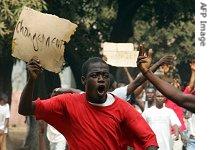2007年VOA标准英语-Rights Groups Call for Investigation of Guinea(在线收听)
Dakar
24 April 2007
Human-rights groups are calling for an investigation into the Guinea government's use of force that left more than 100 dead following nationwide, union-led strikes and protests in January and February. Kari Barber reports from VOA's West Africa bureau in Dakar.
 |
| Protesters march during a demonstration, part of a general strike in Conakry, 22 Jan 2007 |
Guinean rights activist Gadiri Diallo has been looking into the government's use of force, which he says was excessive. He says armed security forces shot unarmed civilians at protests.
Diallo says, in the past, government investigations into alleged human-rights abuses by security forces have been incomplete and have not held anyone accountable.
Diallo says he hopes that, this time, an independent investigation will quickly produce results.
Dustin Sharp, with the U.S.-based Human Rights Watch, says this is a chance for the nation to move forward and reconcile.
"I think putting together an independent inquiry, prosecuting those responsible for the abuses, and thereby really striking a blow to the impunity that just gangrenes the Guinean judicial system would be a really important step in building the rule of law and a stable, more prosperous future," he said.
Sharp says Guinea's former minister of justice has taken steps to create an independent investigative body.
"There is a political will to try to improve on what has happened in the past," he added. "Guinea is going to need a lot of help, they have no experience doing an investigation on this scale, on this magnitude."
Guinea is in a period of relative peace following a deal between strike leaders and President Conte that led to the naming of new members of government and the appointment of Mr. Kouyate to the post of prime minister. Despite this calm, Sharp says it is important to continue examining what went wrong.
"There is still a great anger in the Guinean population that can boil over at any point," he explained. "I think to stabilize the situation, to prevent further repression, it is critical those responsible for the human rights abuses perpetuated during the strike be brought to account."
The strike, in which many protesters called for President Conte's resignation, began in January as a reaction to inflation and perceived government corruption.